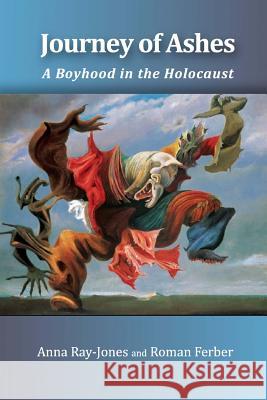Journey of Ashes: A Boyhood in the Holocaust » książka
Journey of Ashes: A Boyhood in the Holocaust
ISBN-13: 9781496150288 / Angielski / Miękka / 2014 / 380 str.
Journey of Ashes: A Boyhood in the Holocaust traverses a fine line between humor and tragedy, and presents a fascinating, lively memoir of a young boy (eventually a Schindler Jew) growing up in Krakow surrounded by the German occupation. It also depicts his family's striving for normalcy in the face of the unimaginable. Many people, especially children, in the context of being terrorized by the Nazi regime, still maintained a strong semblance of what it meant to be ordinarily human. They laughed, argued, loved and feasted, and nurtured each other, even as their world was eroding. For most Holocaust survivors, memory is a shifting force, hammered and reshaped by the healing mechanisms of time, distance and circumstance. This is both a challenge and a gift to a writer. This book details the visceral wartime experiences of a child from the age of six to thirteen, yet the actual story was only awakened some sixty years later. The work is the result of a creative collaboration between Holocaust survivor, Roman Ferber, and author/screenwriter, Anna Ray-Jones, who found in the shaping of the manuscript that much history is under constant reconstruction, and that veracity is not the only road to channeling Roman's boyhood experiences onto the printed page. By the time he reached his twelfth birthday, Roman had been confined in the Krakow Ghetto, and the camps of Plaszow, Gross Rosen, Brinnlitz, and Auschwitz. Thanks to his older brother, Manek Ferber and his friendship with Oskar Schindler, Roman found himself one of the youngest Jews on Schindler's list, along with his father, grandfather and an 8-year old cousin, Wilus Schnitzer. However, even the famous list didn't save them from being exiled to Auschwitz where the lives of children where extinguished daily. Once his father was sent on a forced march to Germany in 1945 (where he was murdered) Roman was left to care for Wilus alone. It is a tribute to his enduring courage and his sturdy sense of self that the two kids survived. Holocaust fiction frequently offers philosophical and psychological elements not always present in testimonial narratives. In this literary sector, writers quest for truth and significance through interpretation and command all the bells and whistles of the novelist's toolbox. Journey of Ashes claims a small corner in this field filled with variegated constructs of storytelling. The result is a literary fusion: a book woven from true narrative, imagination, memory and fiction. In its telling, the story creates a point of view that combines a child's acute observations with the verbal and psychological deft of an adult memoir. This allows the reader to journey with Roman the younger, seeing the world ablaze with destruction just as he witnessed it. Along the route one is also engaged in intimate commentary with the elderly survivor (now a man in his eighth decade) looking back at the boy who charted a living road through the maelstrom. Ray-Jones and her luminous writing blend fiction and interpretation with historic circumstance, constructing characters from archetypes of the period and integrating them into the story. The grace and humanity of the book places Journey of Ashes among the finest works of Holocaust literature."
Zawartość książki może nie spełniać oczekiwań – reklamacje nie obejmują treści, która mogła nie być redakcyjnie ani merytorycznie opracowana.











